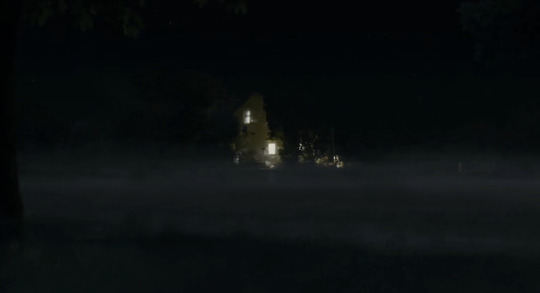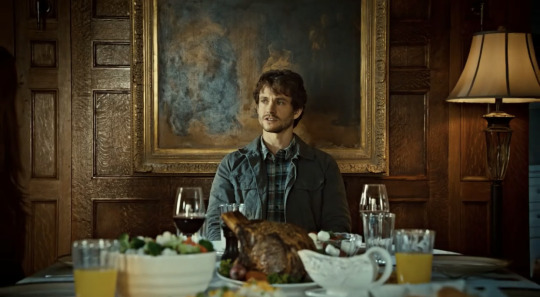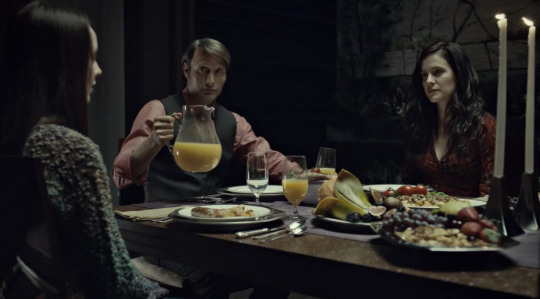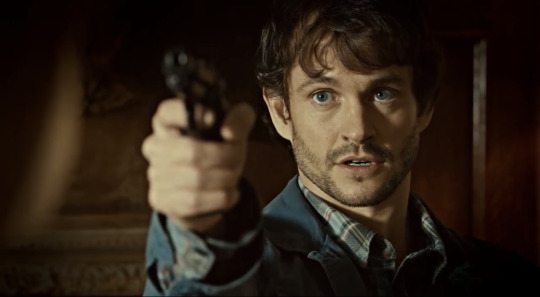#anyway I’ll keep unpacking episodes as I go along if I get brainrot this intense again 👍
Text
okay so I watched ouef (s1 ep4) last night and I only vaguely remembered it as the episode with the lost boys and the creepy family dinner, but now that I’ve rewatched it I’m losing my mind over how much it actually sets up/foreshadows mizumono, especially thematically. considering this, it’s surprising how little this episode is talked about so I’ve decided I’m gonna unpack it myself because I honestly see it as mizumono’s necessary counterpart. it’s first half, if you will
so let’s talk about oeuf
I think part of the reason why a lot of early s1 isn’t discussed as widely as the rest of the show (especially late s2 and s3 in general) is because of the prescriptive use of genre conventions that underpin the “monster of the week” format that, upon first glance, makes s1a seem a little less interesting. it strongly follows the rules and expectations of the standard crime procedural that we’ve come to expect from a show like this: first there’s a murder, then our cast of characters go to investigate, slowly unravelling the mystery while learning some lesson along the way, until finally they catch the bad guys and the episode ends with justice prevailing, resolving the initial injustice of the crime. overall we’re left feeling satisfied, but it’s nothing to write home about
nonetheless, it is very important that nbc hannibal follows this formula in s1 because it allows it to meet audience expectations while also setting up the building blocks for its later acts, which, as we know, (mostly) abandons this scaffolding entirely. you can’t break the rules unless you know the rules, and s1 proves this by luring us in through its promise of convention. you could argue that, in its own way, s1 is the show’s own person suit
that’s not to say the “monster of the week” formula completely hides the show’s gothic side. beyond the show’s visual aesthetics (dark colours, artistic murders, etc) and the almost supernatural quality of will’s empathy, each episode/murder so far has had an underlying “fairytale-like” quality to it that’s achieved through the use of specific allusions/familiar images. first it’s will describing abigail as willy wonka’s golden ticket, then it’s the mushroom garden, then sleeping beauty wakes from her coma, and now we have peter pan and the lost boys. considering how the rest of the show plays out, especially s3 where hannibal literally describes the italy trip and his perception of life as a fairytale, this seems intentional to me. I mean, he and will literally adhere to the beauty and the beast archetype, with both fitting either role depending on what aspect of their relationship you’re looking at
that’s all to say, it’s notable that mizumono acts as the literal gateway between the familiar world of s1 and 2 and the phantasmagoric beauty of s3, stripping both its main characters and the show itself of their person suits, which isn’t as jarring as it should be due to the particular way s1 is structured
which takes us back to what I really want to talk about: ouef
the episode opens in baltimore, where will tells hannibal this:

as will speaks, we see his house, lit up and observed at a distance in the middle of nowhere, caught in the vast, misty darkness he describes. linking the house with the boat is important, since this dual image develops throughout the rest of the episode. thematically, ouef is about family, as is represented through the monster of the week: the woman kidnapping the lost boys and manipulating them into killing their families. but as we said before, this scaffolding is designed to set up character specific concepts and themes that’ll be relevant later. for now, will’s home is only a safe space for him at an observable distance — only “safe” because it looks like a boat at sea, which is a positive association for him

houses traditionally represent the self. it’s an image commonly linked to identity, both on a literary level and oftentimes when interpreting dreams. and of course, when talking about the house we naturally think of family. will can only appreciate the intimacy of both himself and his personal connections from an observable distance. he does not feel safe doing otherwise. it’s why his house is located so far away from the rest of society: he’s in hiding
from here, hannibal is quick to change the subject, stating that will “stood in the breathing silence of garret jacob hobbs’ home”, or, metaphorically speaking, hobbs’ identity. in episode one, will saw the truth of hobbs more so than he’s ever seen (or embraced) the truth of himself. he was not at a distance. he was not safe
then hannibal asks, “did they speak to you?”
and will responds, “with noise and clarity”
he then follows this by saying he “tried so hard to know garret jacob hobbs. to see him” beyond the police tape and dead girls and photographs, all of which he considers superficial details. this particular phrasing is significant, since it directly parallels what hannibal later tells will in mizumono after he learns of his betrayal: “I let you know me. see me.” this scene lays out the dominoes for this chain reaction, all of which results in s2’s climactic moment, by showing hannibal’s desire to be seen, even if he doesn’t fully realise it yet, and will’s desire to connect with others like himself, if they even exist. as I’ve said before, will does not think monstrosity and humanity are separate concepts
so, by wanting to see beyond hobbs’ person suit, which in of itself is a metaphor for conformity, expectations, and the false self, will set aside his own denial and discovered something very ugly about himself. he murdered hobbs in his own home and, for the briefest moment, caught a glimpse of the truth of himself. “see?” haunts will for this reason. it’s something he carries for the rest of his arc
it’s important that this all happened in the kitchen, but I’ll get to that later
but returning to the scene. hannibal asks will how he felt seeing marissa, the girl hannibal killed last episode. there’s an unspoken question here: did you try hard to get to know me too? did you know me? see me? would I ever allow you to do so? under the copycat guise, and the person suit, is knowing me even possible? as we learn in mizumono, the answer is yes
will says he feels guilty and I don’t think he’s lying here the same way he lied when he told abigail murder is the ugliest thing in the world last episode. there’s a difference between feeling guilt and feeling remorse. he thinks he caused marissa’s death, and he feels guilty because he knows he isn’t feeling (or reacting) the way he should be. killing hobbs felt good, remember? he saw hobbs, and in turn himself, with “noise and clarity” and had a moment of chilling self awareness he can’t shake. this is what he feels guilty about. it’s not about “not saving her” it’s about the threat of his self-destructive nature burning everything around him, which is what he fears. he feels monstrous inside, due to his own sense of vindication and inclination towards righteous violence
for the rest of this scene, I’m going to pick apart the dialogue in a kind of skeleton structure so we can take what information we need from what they say. their conversation goes as follows:
“sometimes I felt like we were doing the same things at different times of day. like I was eating or showering or sleeping at the same time he was.”
→ will feels like he’s doing the same things hobbs was (showering/sleeping/eating) even after he was dead because he’s now sensing hannibal, the copycat. or rather, his own copycat/foil. they’re already connected and they already feel the same (he feels like he killed marissa even though hannibal killed marissa)
“even after he was dead?” / “even after he was dead.”
→ so it’s hannibal he’s connecting to now, even subconsciously
“like you were becoming him?”
→ the introduction of the “becoming” motif which, as we all know, is a central theme and another reference to their foil dynamic (hannibal has already said he and will are the same). note hannibal’s tone when he says this: he’s speaking quicker, unable to stop questioning. there’s another conversation happening just below the surface of this one. he’s curious about will and his ability to connect, which was established earlier in episode 2
“I know who I am. I’m not garret jacob hobbs”
→ links back to the first episode where will, out of his own free will, chooses to shoot hobbs. remember that in the opening scene of that same episode he himself tells his students that, according to his own worldview, by understanding the murder, we understand the man. this isn’t a matter of confusing his identity with that of a killer: will knows exactly who he is, and that’s what scares him. he’d rather stay in denial
it’s also noteworthy that will’s refusal to be seen as hobbs, or a copycat of him, mirrors hannibal’s refusal to be associated with him too, as we saw in episode three when he tells abigail “I am nothing like your dad.” it implies that reading either of these characters as a mirror of someone else (other than each other, of course) would be a misstep. for both will and hannibal, hobbs is just another layer of the person suit. something that’s brutally stripped in mizumono, as I said before
we learn all this in one scene alone. like I said, this episode is complex and packed. the rest of the episode simply expands on the concepts introduced in this one conversation. I won’t go into every scene because this post would turn into an academic paper, but I do want to spend time dissecting a few key scenes which I feel directly link back to mizumono specifically and highlight why this episode is so important: the family dinner scene, hannibal breaking into will’s house, will’s therapy sessions with hannibal, and hannibal and abigail making breakfast together
how will analyses the family dinner, as well as what we learn from this scene, adds to our understanding of how these characters interpret family as a whole. after all, this episode is about “the lost boys” which, to me at least, will and hannibal both are. it’s their lack of real connection that causes them to treat abigail in the idealised way they do, similar to how the woman tries to make her own found family with the kidnapped boys (although this parallel better fits hannibal than will)
within his reconstruction of the crime scene, will sits at the head of the table, saying he’s “brought his family to this home invasion.” of course he’s impersonating the killer here, but this use of the home again (and family) is enough to pay attention to
power and control is also brought up in this scene. will says he controls the turners with “threats of violence. threats that turn to action” which is how hannibal operates (although more psychologically considering his demeanour, he doesn’t seem threatening at first and rarely loses his cool) but he can’t control people that way, least of all will. in the end threats of violence don’t even work, because the more worked up you get the less in control you actually are

will then shoots mrs turner, who, as we later learn, forgives the act since she loves her son. forgiveness (and acceptance) being synonymous with love literally underpins the conflict of s3, which is triggered by hannibal asking will if he’ll forgive him for murdering abigail in mizumono, but it’s first shown here, of all episodes, in the story’s set up. because of this, hannibal killing abigail and stabbing will recalls this episode, perhaps more as an echo than a direct link, but is strengthened nonetheless by this subtle build. added to this, it’s notable that the threat of violence here is also due to a type of betrayal (“family dinner, I wasn’t invited”) but the lost boy sits at the head of the table anyway, where he belongs, much like hannibal does, both at the end of this episode and as the “paternal” father figure throughout most of the show

as will says, this whole sequence portrays family values. twisted ones, but values nonetheless. it’s why I’m more inclined to connect this episode to the s2 finale than I am the s1 finale (although it’s still relevant) because this episode is so strictly about family. mizumono is the same but in reversal: the ideal family hannibal dreams and tries to take control of, since he had no control of his own as a boy, is shattered before his eyes

the other largely significant moment in this episode is when hannibal breaks into will’s house and pierces his thumb on the hook, tying the fishing/boat imagery back to the house again and foreshadowing will as the “lure” (his s2 persona)
what’s important about this scene is that hannibal enters will’s world (his isolated identity) to plant the evidence that’ll later frame him for all the s1 murders, leaving traces of himself on will so that, for a moment, will too becomes the copycat. again, not the exact truth of him or his nature, but a fragmented replica. inauthentic. fake. another layer of the person suit, except this time it’s hannibal’s forced on will
but what’s interesting is that hannibal also gets caught in will’s web. there’s a lot of focus on the hook specifically, and the camera lingers on the feathers, which hannibal takes the time to touch and look at, until finally, he pricks his thumb and draws blood
the irony is that in this moment, before the game even really begins, hannibal loses. he’s already hooked himself. we saw hints of this in the first scene of this episode, how his fascination with will is unlike any other attachment, or lack of attachment, he has, and it encapsulates the whole reason for his downfall: his attachment and obsession. it’s beyond his control (“you cannot control with respect to whom you fall in love”) and humanises him in darkly twisted way. he cannot control his feelings, and he doesn’t know what to do with this
his fate is sealed in this episode, but he doesn’t realise it until mizumono

again, the boat imagery is another interesting thing to note. fishing/boats/anchors are all introduced in this episode as mild, safe things (seeing the house as a boat makes will feels safe, wanting to teach abigail how to fish, hannibal saying will needs an anchor, will and his dad at the boatyard, etc) but fishing has an insidious side, too. one hannibal isn’t aware of. it has a meek mask, and in its own way, acts as another type of security. does will feel safe within his own sense of control, too? that’s the whole point of the person suit, isn’t it? it’s an important question, because the fallout is explored in mizumono. like I’ve said all throughout this analysis: everything here is being set up for a single climactic moment
will also sails to florence later in a boat he builds. he returns to hannibal’s home in s3, sitting in the kitchen with abigail’s ghost, but it isn’t home if hannibal isn’t there, so he sails to find him. I hate to say it, but will’s insane little sailing trip to italy is actually symbolic too if you interpret hannibal as will’s home, and by going to find him will, in turn, is also going home
the scene ends with hannibal sucking the blood from his thumb, before we transition to the blood streaked family portrait, opening the next scene. having the frame of hannibal bleeding being immediately followed by the bloody family portrait seems deliberate to me, since, as we know, he kills abigail later and destroys their “family” because will “makes him bleed”. again, tying the events of mizumono back to the family values introduced in this episode
also, in the script the sound hannibal makes when he sucks the blood from his thumb is described as “not unlike a quick kiss” which is an odd way to phrase it within the literal context of this scene, but makes a lot of sense when you consider what it means symbolically. it’s a small detail, but it recontextualises will “luring” him in as a romantic act, as well as a romantic betrayal


continuing on, what family means to hannibal and his desire to both connect with will and manipulate abigail are both interweaved as the episode progresses. hannibal says that “children transport us to our childhoods”, reframes the idea that will’s family, who will jokingly refers to as a pack of strays, also includes abigail (and without saying it, himself) and that the woman who’s kidnapping the lost boys is engaging in a “perversion” of motherhood. all these things evidently reflect hannibal himself, and the specific trauma he experienced losing his parents and, more to the point, his younger sister. we don’t learn the specifics of this backstory until much later on in the story, but his behaviours (and the trajectory of his character arc) are influenced by it regardless
in contrast, will doesn’t seem all that interested in the concept. he sees family as an “ill fitting suit” (yet another reference to the person suit) and it’s an entirely foreign concept to him (it’s foreign to hannibal too, since they’re the same, but I digress). still, he tries to connect to abigail anyway, but this isn’t motivated by a want for authentic family or someone who understands him, but rather an ideal. will doesn’t want to see the truth of himself, it scares him. he doesn’t want to see the truth of abigail, either. he doesn’t want to see her as her father’s lure (again, fishing imagery) but as something innocent and divorced from what he knows of himself. he ironically buys her fishing gear in this episode (although he never gives it to her) in an attempt to associate her with the same meek mask we discussed earlier. but as we know, this “safety” too has layers
buying abigail a gift also mirrors what hannibal says to will in mizumono: “I gave you a rare gift, but you didn’t want it.” the rare gift is family, which is given value when will says “I can’t give them back what they just gave away” in relation to the lost boys and their dead mothers. it’s again another part of the family values introduced in this episode: family is a rare gift, but it’s not something you can force, which both hannibal and will try to do with abigail (like the mother tries to do with the lost boys)

the “I can’t give them back what they gave away” is particularly important, since it implies permanency and an inability to reverse the action. the gift of family and connection is only rare because once it’s taken from you you can’t have it back; you can’t reverse time; you can’t take back control
this is the crux of hannibal’s entire arc. the belief that he is in control of his life, since, in his mind, he’s godlike and exists beyond human folly and attachment, underpins every single one of his actions leading up to mizumono. for this reason, it’s significant that the teacups are introduced in this episode as a means (and symbolic prop) to control abigail. they are later related back to time but this is meant to be a symbol of hannibal’s power. he directly says that he wants to give abigail her ‘power back’ earlier in the episode, but he’s really just empowering himself. he projects his attachment to mischa onto her, something he pretends doesn’t affect him and he is above of (his approach to dealing with trauma is clear through his interactions with abigail — he thinks she shouldn’t be immersed in the tragedy of the past and should just ‘move on’)

in truth, hannibal wants to recreate the moment of tragedy (both his tragedy and abigail’s tragedy) in order to reverse time and have the perfect family, despite being incapable of this. he’s trying to escape how his trauma makes him feel powerless by attempting to take power back, no matter how futile it is
he attempts to do this here, in his home, by making them breakfast, since in his mind by feeding abigail the same (and last) meal she had with her family, he is in turn engineering a kind of ‘rebirth’ for her. he reassures that although this was the last meal she had with her family, it’ll be the first with him, and tries to take away her bad memories by replacing them with positive associations. the reversal of time is even clear in how he makes breakfast for dinner, flipping literal time on its head for his amusement
for the audience, in this scene we learn he’s a more skilled manipulator than the woman who took the lost boys, since he’s forcing this “blur” between abigail’s father and himself through the use of psychedelics and fostering dependency. he wants to replace hobbs without necessarily becoming him. again, he’s his copycat, not his replica
the fact that this all takes place in the kitchen is also important. it’s the same place hannibal will later kill her, proving he can’t reverse time and he isn’t in control, and that she was never reborn, and he was never her father. and returning to the beginning of this analysis (I said I’d come back to this) will also killed hobbs in his own kitchen, where he finally sees the truth of himself. in mizumono, a reversal occurs: hannibal is now confronted with the truth of himself and, like will, accidentally finds something very ugly by exposing himself
the episode ends with will separated from the ‘family’ and resting with his dogs, similar to how mizumono ends with will lying in his own blood, alone. in summary, oeuf quietly introduces and foreshadows key plot, character, and thematic elements through the conventions of the crime genre, and it’s fascinating to me how many links can be made between this episode and the bloodbath in mizumono
even down to the episode title: the newly formed egg and all the consequences that are to follow its hatching
#I’m feeling so insane guys#can anyone hear me#each meta is longer than the last LMAO#I wrote a whole damn essay but it was worth it#this episode is such a gem like *screams into the abyss*#this was basically the serious analysis side of the notes I took#alongside the meme ones I’ve been sharing recently <3#the duality of man#anyway I’ll keep unpacking episodes as I go along if I get brainrot this intense again 👍#and if anyone is interested in more long analysis stuff like this#hannibal#nbc hannibal#will graham#abigail hobbs#hannigram#hannibal meta#long post#ghost speaks
193 notes
·
View notes